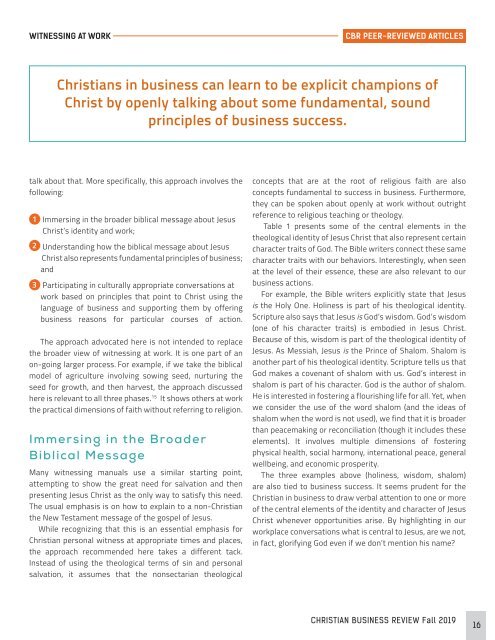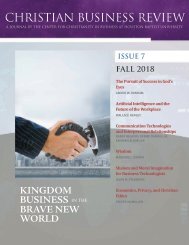Christian Business Review 2019: Workplace Practices That Glorify God (Issue 8)
You also want an ePaper? Increase the reach of your titles
YUMPU automatically turns print PDFs into web optimized ePapers that Google loves.
WITNESSING AT WORK<br />
CBR PEER-REVIEWED ARTICLES<br />
<strong>Christian</strong>s in business can learn to be explicit champions of<br />
Christ by openly talking about some fundamental, sound<br />
principles of business success.<br />
talk about that. More specifically, this approach involves the<br />
following:<br />
1 Immersing in the broader biblical message about Jesus<br />
Christ’s identity and work;<br />
2 Understanding how the biblical message about Jesus<br />
Christ also represents fundamental principles of business;<br />
and<br />
3 Participating in culturally appropriate conversations at<br />
work based on principles that point to Christ using the<br />
language of business and supporting them by offering<br />
business reasons for particular courses of action.<br />
The approach advocated here is not intended to replace<br />
the broader view of witnessing at work. It is one part of an<br />
on-going larger process. For example, if we take the biblical<br />
model of agriculture involving sowing seed, nurturing the<br />
seed for growth, and then harvest, the approach discussed<br />
here is relevant to all three phases. 15 It shows others at work<br />
the practical dimensions of faith without referring to religion.<br />
Immersing in the Broader<br />
Biblical Message<br />
Many witnessing manuals use a similar starting point,<br />
attempting to show the great need for salvation and then<br />
presenting Jesus Christ as the only way to satisfy this need.<br />
The usual emphasis is on how to explain to a non-<strong>Christian</strong><br />
the New Testament message of the gospel of Jesus.<br />
While recognizing that this is an essential emphasis for<br />
<strong>Christian</strong> personal witness at appropriate times and places,<br />
the approach recommended here takes a different tack.<br />
Instead of using the theological terms of sin and personal<br />
salvation, it assumes that the nonsectarian theological<br />
concepts that are at the root of religious faith are also<br />
concepts fundamental to success in business. Furthermore,<br />
they can be spoken about openly at work without outright<br />
reference to religious teaching or theology.<br />
Table 1 presents some of the central elements in the<br />
theological identity of Jesus Christ that also represent certain<br />
character traits of <strong>God</strong>. The Bible writers connect these same<br />
character traits with our behaviors. Interestingly, when seen<br />
at the level of their essence, these are also relevant to our<br />
business actions.<br />
For example, the Bible writers explicitly state that Jesus<br />
is the Holy One. Holiness is part of his theological identity.<br />
Scripture also says that Jesus is <strong>God</strong>’s wisdom. <strong>God</strong>’s wisdom<br />
(one of his character traits) is embodied in Jesus Christ.<br />
Because of this, wisdom is part of the theological identity of<br />
Jesus. As Messiah, Jesus is the Prince of Shalom. Shalom is<br />
another part of his theological identity. Scripture tells us that<br />
<strong>God</strong> makes a covenant of shalom with us. <strong>God</strong>’s interest in<br />
shalom is part of his character. <strong>God</strong> is the author of shalom.<br />
He is interested in fostering a flourishing life for all. Yet, when<br />
we consider the use of the word shalom (and the ideas of<br />
shalom when the word is not used), we find that it is broader<br />
than peacemaking or reconciliation (though it includes these<br />
elements). It involves multiple dimensions of fostering<br />
physical health, social harmony, international peace, general<br />
wellbeing, and economic prosperity.<br />
The three examples above (holiness, wisdom, shalom)<br />
are also tied to business success. It seems prudent for the<br />
<strong>Christian</strong> in business to draw verbal attention to one or more<br />
of the central elements of the identity and character of Jesus<br />
Christ whenever opportunities arise. By highlighting in our<br />
workplace conversations what is central to Jesus, are we not,<br />
in fact, glorifying <strong>God</strong> even if we don’t mention his name?<br />
CHRISTIAN BUSINESS REVIEW Fall <strong>2019</strong><br />
16 2














